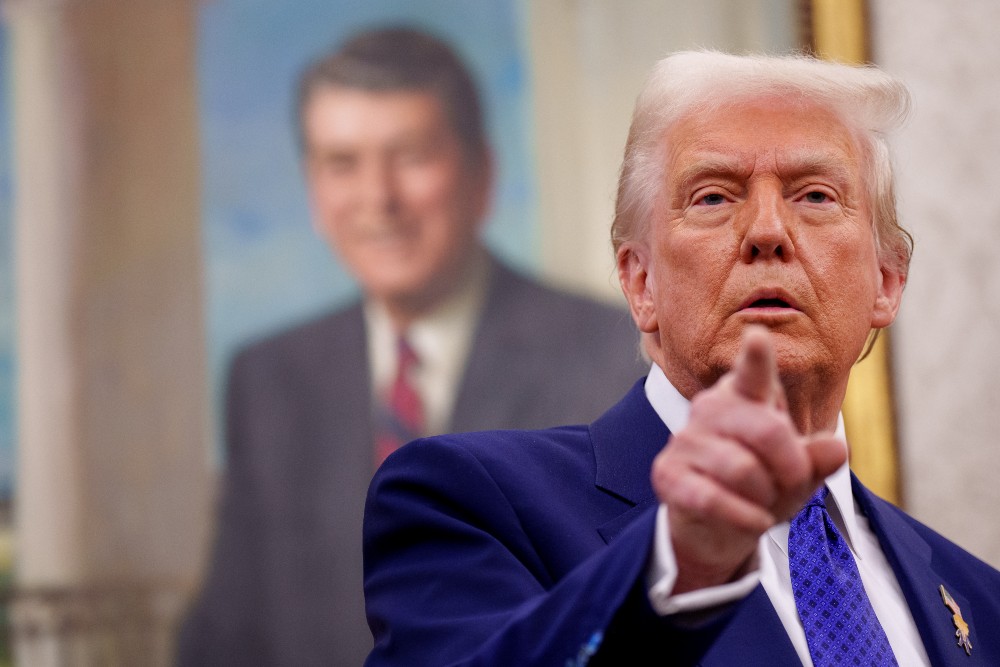Physical Address
304 North Cardinal St.
Dorchester Center, MA 02124
Physical Address
304 North Cardinal St.
Dorchester Center, MA 02124

President Donald Trump’s decision to explore reciprocal tariffs on America’s trading partners as soon as April 1 has drawn swift criticism from the European Commission, which on Friday said it would “take firm and immediate action against unjustified barriers to free and fair trade.”
The EU governing body, which represents 27 nations on trade issues, said in a statement that it would hit back against Trump’s proposal, as tariffs are being used “to challenge legitimate and non-discriminatory policies.”
Contrary to Trump’s claims, the trade bloc has some of the world’s lowest tariffs, it added. The most recent World Bank tariff data, compiled from United Nations databases in 2022, showed that the weighted mean for applied tariffs across all products in France, Italy, Germany, Switzerland, Sweden, Finland, Poland, Greece, Romania, Croatia and Austria was 1.33 percent, compared to the U.S. at 1.49 percent. More than 70 percent of imports enter the EU duty-free, the statement added.
“Tariffs are taxes. By imposing tariffs, the U.S. is taxing its own citizens, raising costs for business, stifling growth and fuelling (sic) inflation,” it said. “Tariffs heighten economic uncertainty and disrupt the efficiency and integration of global markets.”
Trump’s policies fly in the face of established trading commitments that have been forged between the U.S. and EU countries, the statement said. “World trade has flourished under predictable, transparent rules and low tariffs. For decades, the EU has worked with trading partners like the U.S. to reduce tariffs and other trade barriers worldwide, reinforcing this openness through binding commitments in the rules-based trading system—commitments that the U.S. is now undermining.”
The statement also took aim at the U.S. for failing to cement new trade relationships or foster a healthy global trade strategy, saying, “The EU has negotiated and concluded over three times as many trade agreements as the U.S.”
The EU Commission is not alone in its disapproval and consternation over the president’s proposed tariffs. House Democrats of the Ways and Means Committee called upon Trump to retract his executive order imposing 25-percent duties on goods from Canada and Mexico before they go into effect March 4. Lashing out at allies weakens the country’s stance and only fuels China’s trade prowess, they argued.
“It is deeply concerning, and revealing, that your tariff order levies steeper rates on U.S. partners that are actively working with us to address the fentanyl crisis than it does on China,” the lawmakers wrote in a letter to the White House. “Threatening our closest allies also undermines America’s global leadership and disrupts the progress the United States has made to secure supply chains after the pandemic.”
“Businesses have worked in recent years to move supply chains from places with documented security and labor issues, like China, to partners and allies like Canada and Mexico, where we have robust mechanisms to address unfair trade practices.”
Trump’s tariffs could cost average American households more than $1,200 in added taxes each year, they added.
Consumers are indeed anxious about what Trump’s tariff strategy could mean for their pocketbooks. According to research released by consumer insights firm Numerator this week, 80 percent of American shoppers are worried about how Trump’s tariffs could affect their personal finances and shopping behaviors, with 64 percent concerned that the prices of everyday products will go up.
While the word “tariff” may have entered the mainstream lexicon over the past year, 83 percent of the more than 1,000 shoppers surveyed last week said they were keeping tabs on the issue—and they may understand more about the implications of duties than the federal government would tend to believe. More than two-fifths of respondents said they were worried that tariffs could limit the availability of certain products, and one-quarter said they were anxious about the potential slowdown in economic growth that could arise from imposing duties on other countries.
While consumers are understandably most concerned about the cost of true necessities, they’re also aware that tariffs could impact prices on a range of items that they want and need. More than half (55 percent) said they were concerned about groceries, predictably, but household goods (34 percent), apparel (24 percent) and personal care products (23 percent) also ranked high on their lists.
Shoppers aren’t going to stand idly by and wait for the price hikes to hit them, either. More than three-quarters (76 percent) said they will revise their financial planning and make changes to the way they shop in response to new duties.
These shifts in behavior could include buying fewer imported goods (30 percent) or switching to American-made alternatives (26 percent)—if they can find them. Naturally, this would be the president’s preference, but trading in foreign-made products for domestically made goods will likely prove a rocky road for most shoppers, who have been conditioned to expect a near-limitless selection and low prices.
In the meantime, some shoppers said they’re timing their purchases in response to the tariffs by stocking up ahead of price increases (23 percent) or planning to delay buying until prices stabilize (22 percent).
Following the executive order announcement on Thursday, Trump demurred when asked about whether tariffs would indeed raise prices, saying, “Nobody really knows what is going to happen.”